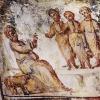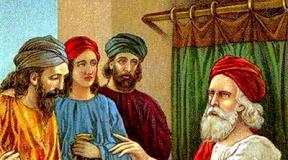He who is faithful in small things is also faithful in big things. Fidelity to God's calling. St. John Chrysostom
The Lord said: he who is faithful in a little is also faithful in much, and he who is unfaithful in a little is also unfaithful in much. So, if you have not been faithful in unrighteous wealth, who will trust you with the true? And if you have not been faithful in what belongs to others, who will give you what is yours? No servant can serve two masters, for either he will hate one and love the other, or he will be zealous for one and neglect the other. You cannot serve God and mammon. The Pharisees, who were lovers of money, heard all this, and they laughed at Him. He said to them: You show yourselves to be righteous before men, but God knows your hearts, for whatever is exalted among men is an abomination to God.
“He who is faithful in a little is also faithful in much, and he who is unfaithful in a little is also unfaithful in much.” Everything we have belongs to God. If we misuse the gifts of Divine Providence, how can we hope for the gifts of His grace? Our infidelity in using them can justly be assessed as neglect of the opportunity to achieve heavenly glory. A little is the riches of this world, a lot is the grace and glory of the next age. If we are unfaithful in small things, we should be afraid that we may be unfaithful in the gifts of God's grace, and therefore lose it. And those who are faithful in small things can be trusted with more. He who serves God by doing good with his money will serve God by doing good with the nobler and more valuable talents of wisdom and grace. And whoever buries one talent of his earthly wealth will never use five talents of spiritual wealth.
“So if you have not been faithful in unrighteous wealth, who will trust you with true wealth?” The riches of this world are false because no one can hold them. And they are unrighteous because they cannot by themselves communicate righteousness to anyone. If we do not use them as we should, who will entrust us with spiritual riches, the only true ones? The truly rich and very rich are those who are rich in faith, Christ God, the Kingdom of God and his righteousness. If we are given other riches, using them worthily, we can receive true riches and be honored with greater grace from God.
“And if you have not been faithful in what belongs to others, who will give you what is yours?” The riches of this world are not ours. They are God's. They are strangers. We have received them from others, we use them for others, and we must soon leave them to others. And spiritual eternal riches are inseparable from us. No one can take them away from us. But this is provided that Christ is ours, His commandments are ours and His heavens are ours. We can find ourselves, become ourselves only in the Lord.
We serve God by giving all our earthly possessions to His service. “No servant can serve two masters.” He who loves the world and adheres to the world will come to despise God. And whoever loves God and devotes himself to Him will see that the world and everything in the world has no value in itself. It should be used only for the service of God and our salvation. “You cannot serve God and money,” says the Lord. Man must choose between God and Mammon, the god of money. So different are their interests that these two ministries never converge.
“The Pharisees, who were lovers of money, heard all this, and they laughed at Him.” Many who have chosen the path of piety, the path of serving God, are overcome by the love of the world. The Pharisees could not bear to have their cherished sin touched. This contemptuous laughter in the face of the Lord is an expression of their utmost hatred for Him. None of the people spoke like Him, and they subject His word to ridicule. Whoever decides to reject the word of God tries to turn it into nothingness. The Lord Himself accepts this reproach, so that His servants would not lose heart when they see contempt for their preaching of the crucified and risen Christ.
The Lord told them: “You show yourselves to be righteous before men.” All their spiritual work consisted of pleasing the opinions of people and justifying themselves before the world. And the world glorified them as the best of people. But the interior of their hearts was always before the gaze of God. “God knows your hearts, for whatever is high among men is an abomination to God.” It is madness to seek human approval and think that everything is fine with us if people don’t know anything bad about us. God knows our hearts and knows what no one else can know. This should make us change our judgment about ourselves. For if God knows our hearts, we have reason to humble ourselves and not trust ourselves. It is madness to judge people by how the majority judges them. The history of mankind, especially in recent times, has shown what this madness leads to. “For whatever is high among men is an abomination to God,” who sees everything in its true light. And many of those whom people despise and even condemn to death are glorified by God along with the First Martyr Christ and all the martyrs and confessors of the first and last times.
Then Jesus stood out of the blue, and many of His disciples, and many people from all Judea and Jerusalem and the seaside places of Tire and Sidon, who came to listen to Him and to be healed of their illnesses, also those suffering from unclean spirits; and were healed. And all the people sought to touch Him, because power came from Him and healed everyone. And He lifted His eyes to His disciples and said: Blessed are the poor in spirit, for yours is the Kingdom of God. Blessed are you who hunger now, for you will be satisfied. Blessed are those who weep now, for you will laugh. Blessed are you when people hate you and when they excommunicate you and revile you and call your name dishonorable because of the Son of Man. Rejoice in that day and be glad, for your reward is great in heaven. This is what their fathers did to the prophets.
In the Gospel of Matthew, the Beatitudes are presented as “the art of living.” In the Gospel of Luke they are like an inexorable demand. In the Gospel of Matthew, the Lord ascends the mountain, the people remain far away, below. Around the Lord there are only His disciples, to whom He privately reveals the depth of His teaching. In the Gospel of Luke, the Lord descends from the mountain where He prayed and chose twelve apostles. Together they go down, “to level ground,” and are met by many students and people. The teaching of Christ must be addressed to everyone, not only to the “best disciples.” Accepting it is decisive for salvation. In addition, in the Gospel of Matthew, the Beatitudes are spoken in the third person: “Blessed are the poor in spirit, for theirs is the kingdom of heaven.” In the Gospel of Luke - in the second person: “Blessed are you.” In the first Gospel, the Lord proclaims the Good News. In the third - judgment: this judgment can be Good News for some, and grief for others. How do we perceive this gift, which gives us the same honor as the apostles?
If we did not know the power of Christ’s love, the power of His Word, we would not dare to pronounce these Beatitudes of His. They contain the mystery of the Church, the mystery of the Kingdom of Heaven, the mystery of Christ Himself. “Blessed are the poor, blessed are those who hunger, blessed are those who mourn.” Do we have the courage to live for the Kingdom of Christ? These stunning words reveal to us that being a Christian means following Christ. For He is the way, the truth and the life (John 14:6). The Beatitudes are what happens to Christ and what He wants to convey to us, so that Divine love will shine in our human hearts. The Beatitudes are at the center of this world of sorrow, unhappiness and suffering. Because Christ left us His peace and His joy. “Peace I leave with you, My peace I give to you; not as the world gives.” (John 14:27). He gives us this peace and this joy at the hour when He goes to the Cross and Resurrection, and when He says to us: “Blessed are the poor, for yours is the Kingdom of God” He gives us life. Your own life. Will we surrender ourselves to Him in return, because He loved us so much? Our life becomes alive when there is the presence of God in it, when we accept the choice that He made for us. Only thanks to the entry of God into our world of misfortune and death can we speak truthfully about bliss. How many of us understand the words of Christ when He addresses us: “Blessed are you when people hate you and when they excommunicate you and revile you and call your name dishonorable”? There is something completely unnatural in this, but here is the heart of the Gospel, the essence of Christ’s truth.
Have you ever met people who have just crossed the threshold of the temple, who, when they are told about the Beatitudes, answer: “But I always felt this, this is exactly what I always wanted, and now this is being revealed to me”? We must pray to the Lord to reveal to us His love, His peace and His joy, which He commanded us to have even in the midst of persecution, because this is the main sign of a Christian. Because a Christian is a witness of the Resurrection of Christ. “If Christ has not been raised, your faith is in vain, you are still in your sins.” If we can proclaim the Beatitudes and live the communion of the Body and Blood of Christ, it is because Christ has risen. All the beatitudes are a consequence of the Resurrection of Christ, and all of them are like the Christification of the Church in the middle of Easter: “Christ is risen!” - “Truly he is risen!”
The Beatitudes begin with the words: “blessed are the poor,” because Christ showed us first of all His poverty. Having nothing, naked on the Cross from His glory, abandoned and betrayed by everyone - in the midst of this betrayal, in the midst of death, in the midst of this poverty, He betrays His spirit into the hands of the Heavenly Father. There is nothing more amazing than this devotion of the Lord to His Father. This is what we must do every moment of our lives - surrender ourselves to the will of the Father, which is the will of bliss. The Lord wants our eternal bliss. Maybe someone is surprised how we dare to so boldly assert that the Lord wants us to be happy in this world, in the way we know it, but this is so, this is the absolute truth.
At the center of our world is the risen Christ. He delivers us from our sins, He gives us hope, He opens heaven to us. He gives us life. Christ rose from the dead, and nothing was impossible anymore. If all life ended here, we would be the most miserable of all people. But the Beatitudes exist because Christ has risen.
The Beatitudes are not an escape from reality, not a surrender of all positions to this cruel world. This is the triumph of the Resurrection of Christ in our lives, which is now hidden, but will be revealed in full at the end of time, when the Lord appears in glory to transform us. May the Lord always be our consolation, mercy and peace, leading us into the freedom of the children of God, who surrender themselves completely into His hands. So that now we can be resurrected with Christ!
St. Simeon the New Theologian
He who is faithful in a little is also faithful in much, and he who is unfaithful in a little is also unfaithful in much.
Do you see that the faithful is the one to whom he entrusts his trust? Whoever does not feel and does not know that something has been entrusted to him, either has not received the grace of the Holy Spirit, or is insensitive, and because of his insensibility it has departed from him. For the Holy Spirit, who gives people wisdom, and knowledge, and piety, and the fear of God, and faith, does not want to dwell in the insensible.
Just as no one can conduct trade without money, the Lord gives to every faithful person, according to his strength and ability, a spiritual denarius, that is, the gift of the Holy Spirit, which would always remain with him at all times and in every matter. Whoever has been entrusted with such a denarius and who has received it must keep it well and try with all diligence and patience to increase it. And listen to how he can multiply it. For example, someone receives the gift of faith and the gift of patience: by faith he believes in what God has promised him, and with patience he endures the sorrows and misfortunes that come upon him. Seeing that he is met with many things contrary to what God promised him, he endures complacently, waiting until the time finally comes for the fulfillment of God’s promises. Here, outwardly, it seems as if the person himself is enduring, but in fact, the power of the grace of the Holy Spirit, which he received, makes him patient and firm. If he does not forget about this power of grace bestowed upon him, then the gift in him multiplies, and he is deemed worthy to receive what God has promised to give him, for Christians, through faith and patience, inherit the promises of God. If he forgets about grace and thinks that he himself bore the burden of trial and patience by his own strength, and not by the power of God’s grace, then he loses grace and remains naked from it; and the devil, finding him naked from Divine grace, pushes him around wherever he wants and how he wants - and there are his last pot of the first.
Words (Word 40th).
St. Macarius the Great
The Lord, intending to raise His disciples to perfect faith, said in the Gospel: he who is unfaithful in few and in many is unfaithful, “ but he who is faithful in little and in many is faithful" What means small? And what does it mean much? Small- this is the essence of the promises of this age, everything that the Lord promised to supply those who believe in Him, for example: food, clothing, and other things that serve for bodily peace, or health, and the like, and which He commanded not to worry about at all, trusting in Him ; because the Lord provides in everything for those who resort to Him. Much but these are the gifts of the eternal and incorruptible age, which He promised to give to those who believe in Him, who constantly care about them and ask Him for them; because this is what he commanded them: you, he says, “ seek first the kingdom of God and His righteousness, and all this will be added to you"(Matthew 6:33). He commanded that each of us be tested in this small and temporary way, whether he believes in God, who promised to provide this, if only we do not worry about that, but become concerned about the future, eternal.
Collection of manuscripts type II. Conversation 48.
St. John Climacus
Whoever exalts himself with natural gifts, that is, wit, understanding, skill in reading and pronunciation, quickness of mind, and other abilities that we acquired without labor, will never receive supernatural benefits; for unfaithful in small things - and unfaithful in many ways and vain.
Word 22. About diverse vanity.
Blzh. Theophylact of Bulgaria
The Lord also teaches that wealth must be managed according to the will of God. "Faithful in Little Things", that is, he who managed well the property entrusted to him in this world, is faithful "and in many ways", that is, in the next century he is worthy of true wealth. Small calls earthly wealth, since it is truly small, even insignificant, since it is fleeting, and many- Heavenly wealth, since it always abides and comes. Therefore, whoever turned out to be unfaithful in this earthly wealth and appropriated what was given for the common benefit of his brothers to himself, he will not be worthy of even that much, but will be rejected as an unfaithful. Explaining what has been said, he adds: “So if you have not been faithful in unrighteous wealth, who will trust you with true wealth?” Unrighteous called wealth the wealth that remains with us; for if it were not unrighteous, we would not have it. And now, since we have it, it is obvious that it is unrighteous, since it is withheld by us and not distributed to the poor. For the theft of someone else's property and that of the poor is injustice. So, whoever manages this estate badly and incorrectly, how can you trust him? true wealth? And who will give us is our when we mismanage strangers, that is, by estate? And it someone else's, since it is intended for the poor, and on the other hand, since we brought nothing into the world, but were born naked. And our destiny is Heavenly and Divine riches, for there is our dwelling (Phil. 3:20). Possessions and acquisitions are alien to man, created in the image of God, for none of them are like him. And enjoying Divine blessings and communicating with God is akin to us. - Until now, the Lord has taught us how to properly manage wealth. For it is someone else's, not ours; we are stewards, not lords and masters. Since the management of wealth according to the will of God is accomplished only with firm dispassion towards it, the Lord added this to his teaching: “You cannot serve God and mammon”, that is, it is impossible for one to be a servant of God who has become attached to wealth and, out of addiction to it, retains something for himself. Therefore, if you intend to properly manage wealth, then do not be enslaved to it, that is, do not have attachment to it, and you will truly serve God. For the love of money, that is, the passionate inclination for wealth, is condemned everywhere (1 Tim. 6:10).
Lopukhin A.P.
Art. 10-13 He who is faithful in a little is also faithful in much, but he who is unfaithful in a little is also unfaithful in much. So, if you have not been faithful in unrighteous wealth, who will trust you with the true? And if you have not been faithful in what belongs to others, who will give you what is yours? No servant can serve two masters, for either he will hate one and love the other, or he will be zealous for one and neglect the other. You cannot serve God and mammon
Developing the idea of the need for the prudent use of wealth, the Lord first cites a proverb: “faithful in little is faithful in much...” This is a general idea that does not require special explanation. But then He directly addresses His followers from among the tax collectors with instructions. They undoubtedly had great wealth in their hands and were not always faithful in their use: often, when collecting taxes and duties, they took a portion of what they collected for themselves. So the Lord teaches them to give up this bad habit. Why should they collect wealth? It is unrighteous, alien, and must be treated as alien. You have the opportunity to receive true, that is, completely valuable wealth, which should be especially dear to you, as it is completely suitable for your position as disciples of Christ. But who will entrust you with this highest wealth, this ideal, genuine good, if you are unable to cope as you should with the lower? Can you be worthy of the benefits that Christ bestows on His true followers in the glorious Kingdom of God that is about to open?
From faithfulness in the use of earthly wealth, Christ (verse 13) moves on to the question of exclusive service to God, which is incompatible with service to Mammon. See Matthew 6:24, where this saying is repeated.
With the parable of the unrighteous steward, Christ, who primarily had publicans in mind, teaches all sinners in general how to achieve salvation and eternal bliss. This is the mysterious meaning of the parable. A rich man is God. An unrighteous steward is a sinner who carelessly squanders the gifts of God for a long time, until God calls him to account with some terrible signs (illnesses, misfortunes). If the sinner has not yet lost his common sense, then he brings repentance, just as the steward forgave the master’s debtors for the debts that he could have accounted for them. But it is clear that going into detailed allegorical explanations of this parable is completely useless, because here you will have to be guided only by completely random coincidences and resort to exaggerations: like any other parable, the parable of the unrighteous steward contains, in addition to the main idea, additional features, which require no explanation.
Archbishop Lolliy (Yuryevsky)
Archbishop Averky (Taushev)
In conclusion, the Lord says: “He who is faithful in a little is also faithful in much; and he who is unfaithful in a little is unfaithful in much. So, if you have not been faithful in unrighteous wealth, who will believe you to be true? And if you have not been faithful in what belongs to others, who will give you what is yours?” - that is, if you were unfaithful in your earthly wealth, did not know how to use it as it should, for the benefit of your soul, then how can you deserve to be entrusted with spiritual wealth, the wealth of grace-filled gifts?
A Guide to Studying the Holy Scriptures of the New Testament. Four Gospels.
Archim. Sophrony (Sakharov)
The grace bestowed at the beginning for the sake of attracting and teaching is sometimes no less than that of the perfect; however, this does not mean at all that it was assimilated by those who received this terrible blessing. The assimilation of God's gifts requires a long trial and intense feat. The complete rebirth of fallen man into " new"(Eph. 4:22-24) takes place in three periods: the first, initial - call and inspiration for the upcoming feat; the second is the abandonment of “tangible” grace and the experience of abandonment by God, the meaning of which is to provide the ascetic with the opportunity to demonstrate loyalty to God in a free mind; the third, final one is the secondary acquisition of tangible grace and its storage, already associated with the intellectual knowledge of God.
“He who is faithful in little is also faithful in much; he who is unfaithful in a little is also unfaithful in much... So, if you have not been faithful in unrighteous wealth, who will believe you to be true? And if you have not been faithful in what belongs to others, who will give you what is yours? " Whoever in the primary period was instructed by the very action of grace in prayer and any other good, and during a long period of abandonment by God lives as if grace was invariably with him, such, after a long trial of his fidelity, will receive “ true» wealth, into already inalienable eternal possession; in other words: grace merges with created nature, and both of these: grace and created nature - become one. This final gift is the deification of man; communicating to him the divine image of being, beginningless, holy; the transformation of the whole person, through which he becomes Christ-like and perfect.
Those who did not remain faithful " in someone else's”, as the Lord puts it, will lose what they received in the beginning. Here we see a certain parallel with the parable of the talents: “ entrusted them with his estate. And he gave to one five talents, to another two, to another one, to each according to his strength... after a long time, the master of those servants comes and demands an account from them... the one who received five... brought another five talents, and says: Master! You gave me five talents, behold, the other five... I purchased with them. His master said to him: Well done, good and faithful servant! in small things you were faithful; I will put you over many things; enter into the joy of your master. The one who received two also came up... and said... behold, I acquired the other two talents with them... well, good and faithful servant! in small things you were faithful; I will put you over many things; enter into the joy of your master. The one who had received one talent came up and said: Master! I knew you that you were... cruel... and being afraid... you hid your talent in the ground: here is yours. The master answered: you are a wicked and lazy servant... take his talent, and give to the one who has ten talents... and from the one who has not, even what he has will be taken away."(Matthew 25:14-29ff.).
And this parable, like the previous one, is not applicable to ordinary human relationships, but only to God: the Master did not take from the one who worked on his talents and doubled them, but everything, both given and acquired by him through labor, gave everything to him in his possession as a co-owner: " Enter into joy(possession of a kingdom) your master" And when the unused talent turns out to be free, then the Master gives it too " to him who has ten... for to everyone"to those who work on the gifts of God" will be given and will increase"(Matthew 25:29) .
"About prayer." About painful prayer in which a person is born for eternity.
- (Codex Aureus Epternacensis, 1035 1040) Parable of the Bo... Wikipedia
One of the parables of Jesus Christ contained in the Gospel of Matthew. One man had two sons; and he, approaching the first, said: son! Go today and work in my vineyard. But he answered: I don’t want to; and then, repenting, he went... Wikipedia
Parable of the workers in the vineyard... Wikipedia
- “The Good Samaritan”, Rembrandt Parable of the Good Samaritan (Parable of the Good Samaritan, P ... Wikipedia
The Wise and Foolish Virgins (Peter Joseph von Cornelius, ca. 1813) The parable of the ten virgins is one of the proverbs ... Wikipedia
The request for "Prodigal Son" redirects here; see also other meanings... Wikipedia
The Good Shepherd (Philippe de Champagne, 17th century) The parable of the lost sheep is one of the parables of Jesus Christ ... Wikipedia
The Found Drachm (John Everett Millais, 1864) The Parable of the Lost Drachm is one of the parables of Jesus Christ, contained in the Gospel of ... Wikipedia
- ... Wikipedia
The Persistent Friend (John Everett Millais, 1864) The parable of the man asking his friend for bread at midnight is one of the parables of Jesus Christ, contained in ... Wikipedia
Books
- Mozart&... Gospel of the Chosen, Otari Kandaurov. Spiritual masters of the late 20th and early 21st centuries were engaged in establishing peace and mutual understanding between “all” and “very few.” The result was the Gospel of the Elect, which is...
- Biblical stories of the New Testament: The Life of Jesus Christ, A. P. Lopukhin. Having collected and analyzed enormous chronological, archaeological, historical and ethnographic material, the outstanding Russian biblical scholar, theologian and writer Alexander Pavlovich Lopukhin... audiobook
God creates inequality, people complain about inequality. Are people wiser than God? If God creates inequality, then inequality is wiser and better than equality.
God creates inequality for the benefit of people; people cannot see their own good in inequality.
God creates inequality for the sake of the beauty of inequality, people cannot see beauty in inequality.
God creates inequality for the sake of love, which is kindled and supported by inequality; people cannot see love in inequality.
This is the ancient human revolt of blindness against insight, madness against wisdom, evil against good, ugliness against beauty, hatred against love. Even Eve and Adam gave themselves over to Satan in order to become equal to God. Cain also killed his brother Abel, because God did not equally despise their sacrifices. From then until now, the struggle of sinful people against inequality has continued. And until then and to this day, God creates inequality. We say “until those times,” for God created even the angels unequal.
God wants people not to be equal in everything external: in wealth, strength, rank, education, position, etc., and He does not order them to compete in any way in this. “Do not sit in first place,” our Lord Jesus Christ commanded. God wants people to compete in increasing internal goods: faith, kindness, mercy, love, meekness and goodness, humility and obedience. God has given both external and internal blessings. But He considers the external goods of man to be cheaper and insignificant than the internal goods. He makes external goods available not only to people, but also to animals. But He reveals a rich treasury of internal, spiritual blessings only for human souls. God gave man something more than animals, which is why He demands more from people than from animals. This “more” consists of spiritual gifts.
God gave external goods to man so that they could serve internal ones. For everything external serves the internal man as a means. Everything temporal is predestined for the service of the eternal, and everything mortal is predestined for the service of the immortal. A person who follows the opposite path and spends his spiritual gifts exclusively to acquire external, temporary benefits, wealth, power, rank, worldly glory, is like a son who inherited a lot of gold from his father and squandered it by buying ashes.
For people who have felt in their soul the gifts of God invested in it, everything external becomes insignificant: like an elementary school for someone who has entered a higher school.
It is the ignorant, not the wise, who fight for external goods alone. The sages wage a harder and more valuable struggle - the struggle to increase internal goods.
Those who do not know how or do not dare to look into themselves and get to work on the internal, main field of their human existence are fighting for external equality.
God does not look at what a person does in this world, what he has, how he is dressed, fed, educated, whether people respect him - God looks at a person’s heart. In other words: God does not look at the external state and position of a person, but at his internal development, growth and enrichment in spirit and truth. Today's Gospel reading speaks about this. The parable of the talents, or the spiritual gifts that God places in the soul of every person, shows the enormous internal inequality of people by their very nature. But it also shows much more. With its eagle gaze, this parable covers the entire history of the human soul, from beginning to end. Anyone who would fully understand this one and only parable of the Savior and fulfill the command contained in it with his life, would gain eternal salvation in the Kingdom of God.
For He will act like a man who, going to a foreign country, called his servants and entrusted them with his property: and to one he gave five talents, to another two, to another one, to each according to his strength; and immediately set off. By man we must understand the Almighty God, the Giver of all good gifts. By slaves we mean angels and people. Traveling to a foreign country signifies God's patience. Talents are spiritual gifts that God bestows on His intelligent creatures. The greatness of all these gifts is shown by the fact that they are deliberately called talents. For one talent was a large coin, the value of which was equal to five hundred gold chervonets. As was said, the Lord deliberately called the gifts of God talents in order to show the greatness of these gifts; to show how generously the Most Good Creator bestowed His creations. So great are these gifts that the one who accepted one talent received quite enough. By man is meant our Lord Jesus Christ Himself, as can be seen from the words of the Evangelist Luke: a certain man of high birth. This Man of high birth is our Lord Jesus Christ Himself, the Only Begotten Son of God, the Son of the Most High. And this is also clearly evident from the subsequent words of the same evangelist: he went to a distant country in order to receive a kingdom for himself and return (Luke 19:12). After His ascension, our Lord Jesus Christ went to heaven to receive the Kingdom for Himself, giving the world a promise to come to earth once again - as a Judge. Since man is understood as our Lord Jesus Christ, it means that His servants are the apostles, bishops, priests and all the faithful. On each of them the Holy Spirit poured out many gifts - good, but different and unequal, so that believers, complementing each other, would thus all together morally improve and grow spiritually. There are diversities of gifts, but the same Spirit; and the services are different, but the Lord is the same; and the actions are different, but God is one and the same, producing everything in everyone. But the manifestation of the Spirit is given to everyone for the benefit... Yet the same Spirit works all these things, distributing to each one individually, as He pleases (1 Cor. 12:4-11). In the sacrament of baptism, all the faithful receive an abundance of these gifts, and in other church sacraments God strengthens and multiplies these gifts. By five talents, some interpreters understand the five senses of man, by two - soul and body, and by one - the unity of human nature. The five bodily senses are given to man so that they serve the spirit and salvation. With body and soul, a person must work diligently for God, enrich himself with the knowledge of God and good deeds. And a person must devote himself entirely to serving God. In childhood, a person lives with five senses, a full sensual life. At a more mature age, he feels duality and struggle between flesh and spirit. And in a mature spiritual age, a person realizes himself as a single spirit, defeating the internal division into five and two. But it is precisely at this mature age, when a person considers himself a winner, that he faces the greatest danger of disobedience to God. Having reached the greatest heights, he then falls into the deepest abyss and buries his talent.
God gives gifts to everyone according to his strength, that is, in accordance with how much a person can bear and use. Of course, God bestows gifts on people according to the plan of the holy economy. So those who build a house do not have the same abilities and do not do the same work: they have different abilities and different tasks, and each of them works according to his own strength!
And he set off immediately. These words mean the speed of God's creation. And when the Creator created the world, He created it quickly. And when our Lord Jesus Christ came to earth for the sake of a new creation, for the sake of the renewal of the world, he quickly accomplished His work: calling the slaves, distributing gifts to them and immediately setting off.
So what did the slaves do with the talents they received?
He who received five talents went and put them to work and acquired another five talents; in the same way, the one who received two talents acquired the other two; He who received one talent went and buried it in the ground and hid his master’s money. All labor activity and all trade that exists among people are an image of what happens - or what should happen - in the souls of men. From anyone who has inherited any property, people expect that he will increase this property. Anyone who has acquired a field is expected to work that field. Anyone who has learned a trade is expected to practice it both for his own benefit and for the benefit of his neighbors. Anyone who knows any handicraft is expected to show his knowledge. Anyone who has invested money in trade is expected to multiply that money. People move, work, improve things, collect, exchange, sell and buy. Everyone tries to obtain what they need for bodily life, everyone tries to improve their health, satisfy their daily needs and ensure their bodily existence for as long and as long as possible. And all this is just an image of what a person should do for his soul. Because the soul is the main thing. All our external needs are images of our spiritual needs, reminders and lessons that we need to work for our soul, hungry and thirsty, naked and sick, unclean and miserable. Therefore, each of us, who has received from God five, two, or one measure of faith, wisdom, love of mankind, fear of God, meekness, obedience to God or longing for spiritual purity and strength, is obliged to work to at least double this measure, as we did the first and second slave and as people engaged in trade and crafts usually do. He who does not increase the talent given to him - whatever this talent may be - will be cut down, like a tree that does not bear good fruit, and thrown into the fire. What every owner does with a barren fig tree, which he dug up, grafted and fenced in vain, but which still did not bear him any fruit, the Supreme Householder of the universal garden will do the same, where people are His most precious trees. See for yourself what bewilderment and contempt arouses in people the one who, having inherited an estate from his father, does nothing but wastes the inheritance on bodily needs and pleasures! Even the lowest beggar is not as despised by people as such a selfish sloth. Such a person is a true image of a spiritual sloth who, having received from God one talent of faith, wisdom, eloquence or some other virtue, buries it without using it in the dirt of his body, does not increase it through labor, and out of pride and selfishness does not bring it to anyone. benefits.
After a long time, the master of those slaves comes and demands an account from them. God does not move away from people for a single moment, much less for a long time. His help to people flows like a deep river day after day, but His Judgment, His demand for an account from people occurs over a long period of time. The Quick Helper to everyone who calls on Him for help, God is slow to reward those who insult Him and wantonly squander His gifts. Here we are talking about the last, Last Judgment, when the hour comes and all workers will be called to accept their wages.
And the one who had received five talents came and brought another five talents and said: Master! you gave me five talents; Behold, I acquired another five talents with them. His master said to him: Well done, good and faithful servant! You have been faithful in small things, I will put you over many things; enter into the joy of your master. The one who had received two talents also came up and said: Master! you gave me two talents; behold, I acquired the other two talents with them. His master said to him: Well done, good and faithful servant! You have been faithful in small things, I will put you over many things; enter into the joy of your master. One by one, the slaves approach their master and give an account of what they have received and what they have earned with the help of what they have received. One by one, we will be forced to approach the Lord of heaven and earth and, before millions of witnesses, account for what we have received and what we have earned. At this hour, nothing can be hidden or corrected. For the Lord’s radiance will so illuminate those present that everyone will know the truth about everyone. If in this life we manage to double our talents, then we will appear before the Lord with a clear face and a pure heart, just like these two good and faithful servants. And we will be forever revived by His words: good and faithful servant! But alas for us if we appear empty-handed before the Lord and His holy angels, like the third, wicked and lazy servant!
But what do the words mean: you have been faithful in a few things, I will put you over many things? They mean that all the gifts that we receive from God in this world, no matter how many there are, are small compared to the treasures that await the faithful in the next world. For it is written: eye has not seen, nor ear heard, nor entered into the heart of man the things that God has prepared for those who love Him (1 Cor. 2:9). The smallest work for the sake of God’s love is rewarded from God with generous royal gifts. For the little that the faithful will endure in this life out of obedience to God and for the little that they do while working on their souls, God will crown them with glory, which none of the kings of this world has ever known or had.
Now let's see what happens to wicked and unfaithful slaves:
The one who had received one talent came up and said: Master! I knew you that you were a cruel man, reaping where you did not sow, and gathering where you did not scatter, and, being afraid, I went and hid your talent in the ground; here's yours. This is how this third servant justifies his wickedness and laziness before the Master! But he is not alone in this. How many of us are there who shift the blame to God for their malice, negligence, idleness and selfishness! Without recognizing their sinfulness and not recognizing the humane ways of God, they grumble at God for their weaknesses, illnesses, poverty, and failures. First of all, every word spoken by a lazy slave to the Master is a real lie. Does God reap where he did not sow? And does He gather where He has not scattered? Is there any good seed in this world that was not sown by God? And are there any good fruits in the entire universe that are not the results of God’s work? The wicked and unfaithful complain, for example, when God takes their children away from them, saying: “Behold, what cruelty - He untimely takes our children away from us!” Who said these children are yours? Did they not belong to Him before you called them yours? And why is it untimely? Doesn’t He who created times and seasons know when the time is for something? Not a single owner on earth puts off cutting his forest, waiting until all the trees in it grow old, but in accordance with his needs, he cuts both old and young, those that have been standing for a long time, and those that have just emerged, depending on the what he needs for his farm. Instead of grumbling against God and blaspheming Him, on Whom their every breath depends, it would be better to say like the righteous Job: The Lord gave, the Lord has taken away; as the Lord pleased, so it was done; Blessed be the name of the Lord! And how the wicked and unfaithful grumble against God, when a hailstorm destroys their grain, or when their ship with its cargo sinks into the sea, or when illnesses and infirmities attack them - they grumble and accuse God of cruelty! And this happens only because they either do not remember their sins, or cannot learn a lesson from this to save their soul.
To the false justification of His servant, the Master replies: His Master answered him: you are a wicked and lazy servant! You knew that I reap where I did not sow, and gather where I did not scatter; Therefore, you should have given my silver to the merchants, and when I came, I would have received mine with profit. People involved in money transactions are also called money changers. These are those who exchange one type of money for another and thus make a profit as a result of the exchange. But all this has its own figurative meaning. By traders we should understand those who do good, by silver - the gifts of God, and by profit - the salvation of the human soul. You see: in this world, everything that happens to people externally is only an image of what happens - or should happen - in the spiritual realm. Even money changers are used as an image of the spiritual reality that takes place inside, in the people themselves! The Lord wants to say to the lazy servant: “You received one gift from God; you did not want to use it yourself for your own salvation; why didn’t you at least give it to some virtuous person, some kind-hearted person who would want and be able to give it? should he transfer it to other people who need it, so that it would be easier for them to be saved? And I, having come, would have found more saved souls on earth: more faithful, more ennobled, more merciful and meek. Instead, you hid the talent in the earth of your body, which. has decayed in the grave (for the Lord will say this at the Last Judgment) and which now cannot help you in any way!”
Oh, how clear and how terrible is the lesson for those who, having great wealth, do not distribute it to the poor; or, having a lot of wisdom, keeps it closed in himself, as in a grave; or, having many good and useful abilities, does not show them to anyone; or, having great power, does not protect the suffering and oppressed; or, having a great name and glory, does not want to illuminate those in darkness with a single ray! The kindest word that can be said about all of them is thieves. For they consider the gift of God to be theirs: they appropriated what belonged to others and hid what was given. However, they are not only thieves, but also murderers. For they did not help to save those who could have been saved. Their sin is no less than the sin of a man who, standing on the bank of a river with a rope in his hands and seeing someone drowning, did not throw him a rope to save him.
Truly, the Lord will say to such people what he said to the wicked servant in this parable.
So, take the talent from him and give it to the one who has ten talents, for to everyone who has it will be given and he will have an abundance, but from the one who does not have, even what he has will be taken away. and throw the worthless slave into outer darkness: there will be weeping and gnashing of teeth. And in this life it usually happens that it is taken away from those who have little and given to those who have much. And this is only an image of what is happening in the spiritual realm. Doesn't a father take money from a dissolute son and give it to a wise son who can use it profitably? Doesn't a military commander take away ammunition from an irresponsible soldier and give it to a good and reliable soldier? God takes away His gifts from unfaithful slaves in this life: hard-hearted rich people usually go bankrupt and die in poverty; selfish wise men end up in extreme stupidity or madness; proud ascetics indulge in sin and end their lives as great sinners; despotic rulers experience reproach, shame and impotence; priests who did not instruct others either by word or by example fall into more and more serious sins until they part with this life in terrible agony; hands that did not want to do the work that they knew how to do begin to tremble or lose mobility; the tongue, which did not want to speak the truth that it could speak, swells or becomes mute; and in general, everyone who hides God’s gifts die as mediocre beggars. Anyone who did not know how to give while he had it will be forced to learn to beg when his property is taken away from him. Even if the gift given to him is not taken away from some cruel and stingy selfish person just before his death, it will be taken away by his closest descendants or relatives who received this gift as an inheritance. The main thing is that the talent given to him is taken away from the infidel, and after that he is condemned. For God will not condemn a person as long as the gift of God’s grace remains in him. Before the sentence is carried out on him, a person convicted by an earthly court is stripped of his clothes and dressed in prison clothes, clothes of condemnation and shame. Likewise, every unrepentant sinner will first be stripped of all that is Divine on him, and then thrown into outer darkness: there will be weeping and gnashing of teeth.
This parable clearly teaches us that not only those who have done evil will be condemned, but also those who have not done good. And the Apostle James teaches us: if anyone knows to do good and does not do it, to him it is sin (James 4:17). All of Christ’s teaching, as well as His example, direct us to do good. Avoidance of evil is the starting point, but the entire life path of a Christian should be strewn with good deeds, like flowers. Doing good deeds provides immeasurable help in avoiding evil deeds. For it is unlikely that anyone can evade evil without doing good, and remain without sin without practicing virtue.
And this parable also confirms to us that God is equally merciful to all people; for He endows every created person with a certain gift, indeed, some with more, some with less, which does not change the matter at all, since He asks more from the one to whom he gave more, and less from the one to whom he gave less. But He gives enough to everyone so that a person can save himself and help save others. Therefore, it would be a mistake to think that in this parable the Lord speaks only about the rich people of various types who exist in this world. No, He is talking about all people without exception. Everyone, without exception, comes into this world with some gift. The widow who deposited her last two mites in the Temple of Jerusalem was very poor in money, but she was not poor in the gifts of donation and the fear of God. On the contrary, having wisely disposed of these gifts, albeit through two miserable mites, she received the praise of our Lord Jesus Christ Himself. Truly I tell you, this poor widow has contributed more than anyone else (Mark 12:42-44).
But let's take the worst and most mysterious case. Imagine a blind and deaf-mute man who, in this situation, lived his entire life on earth, from birth to death. Some of you will ask: “What gift did such a person receive from God? And how can he be saved?” He has a gift, and a great one. He doesn't see people - but people see him. He does not give alms - but awakens mercy in other people. He cannot remind of God with the help of words, but he himself is a living reminder for people. He does not preach with words - but serves as proof of the sermon about God. Truly, he can lead many to salvation, and through that he can save himself. But know that the blind, deaf and dumb are not usually among those who bury their talent. They don't hide from people, and that's enough. For everything they can show, they show. Themselves! And this is silver, which they put into circulation and return to the Master with a profit. They are God's servants, God's reminder, God's call. They fill human hearts with fear and mercy. They represent the terrible and clear preaching of God, revealed in the flesh. It is those who have eyes, ears, and tongues who most often bury their talent in the ground. They have been given much, and when much is asked of them, they will be unable to give anything.
Thus, inequality lies at the very basis of the created world. But this inequality should cause joy, not rebellion. For he was affirmed by love, not hatred, reason, not madness. Human life is ugly not because of the presence of inequality in it, but because of the lack of love and spiritual intelligence in people. Bring in more Divine love and spiritual understanding of life, and you will see that even twice the inequality will not in the least interfere with the bliss of people.
This parable of the talents brings light, reason and understanding into our souls. But it also prompts us to action and urges us so that we are not late to complete the work for which we were sent by the Lord to the marketplace of this world. Time flows faster than the fastest river. And soon the end of time will come. I repeat: time will soon end. And no one will be able to return from eternity to take what was forgotten and do what was undone. Therefore, let us hasten to use the gift of God given to us, a talent borrowed from the Lord of lords. To our Lord Jesus Christ, about this Divine teaching, as about everything, befits honor and glory, with the Father and the Holy Spirit - the Trinity, Consubstantial and Indivisible, now and ever, at all times and unto the ages of ages. Amen.
From, published by the Sretensky Monastery publishing house. You can purchase the publication in the Sretenie store.
And Jesus Christ spoke another parable against our laziness and negligence.
The Son of Man will act like a man who, going to a foreign country, called his servants and entrusted his property to them. To one he gave five talents, to another two talents, and to a third one talent, to each according to his strength; and immediately set off.

The one who received five talents went and put them to work and acquired five more talents with them. In the same way, the one who received two talents acquired another two with them. The one who received one talent did not want to work, but went and buried it in the ground and hid his master’s money.

After a long time, the master of those slaves returned and demanded an account from them. The one who received five talents brought another five talents and came up to him and said: “Sir, you gave me five talents; behold, I acquired another five talents with them.”

The one who had received two talents also came up and said: “Sir, you gave me two talents; here are the other two talents I acquired with them.”
The master said to him: “Well done, good and faithful servant! You have been faithful in little things, I will put you in charge of many things; enter into the joy of your master.”

The one who had received one talent came up and said: “Sir, I knew you that you are a cruel man, reaping where you did not sow, and gathering where you did not scatter; behold, I, afraid of this, went and hid your talent in the ground. Behold. yours."
The master answered him: “You wicked and lazy servant, with your mouth I will judge you; you knew that I reap where I did not sow, and gather where I did not scatter; therefore you had to give my silver to the merchants; and I, if he returned, he would receive what is mine with profit. So, take the talent from him and give it to him who has ten talents. For to everyone who has it will be given to him; but from him who has nothing, even what he has will be taken away. crying and gnashing of teeth."
Having told this parable, Jesus Christ exclaimed: “Whoever has ears to hear, let him hear!”

This parable means: all people receive from the Lord various gifts, such as: life, health, strength, spiritual abilities, learning, gifts of the Holy Spirit, worldly blessings, etc., in order to serve God and their neighbors with these gifts. All these gifts of God are meant in the parable under the name of talents. God knows how much to give to each, according to his abilities, and that is why they receive - some more, some less. Whoever used the gifts of God in what way, each person will have to give an account to the Lord at His second coming. Whoever uses them to benefit himself and others will receive praise from the Lord and eternal heavenly joys; and lazy and careless people will be condemned by the Lord to eternal suffering.



















